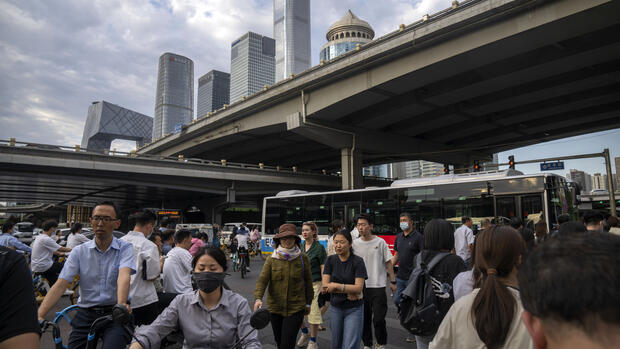China’s economy is recovering from the consequences of the strict zero-Covid policy more slowly than expected.
(Photo: AP)
Beijing China’s strong growth in the second quarter belies growing economic problems. According to official figures, the world’s second-largest economy grew by 6.3 percent between April and June, as the statistics agency NBS announced on Monday. However, the high growth is primarily due to the weak comparative value in the previous year, when the country’s economy grew by only 2.5 percent as a result of the lockdown in Shanghai.
Compared to the first three months of the year, China’s economy grew by just 0.8 percent. This shows that it is recovering from the consequences of the strict zero-Covid policy much more slowly than many hoped at the beginning of the year. Doubts about the correctness of the data are also growing because new laws and restrictions are making access to independent information from the country more difficult.
In addition to the GDP figures, a number of other economic data for June were released on Monday. These show that the Chinese economy is growing, but at a slower pace and more unevenly than expected.
Retail sales in June rose 3 percent from May, slightly less than forecast. Industrial production increased by 4.4 percent compared to the previous month and was therefore stronger than expected.
The customs authorities announced last week that China’s exports had fallen by more than twelve percent in June. At the same time, youth unemployment reached a new record high: 21.3 percent of 16- to 24-year-olds in China’s cities were unemployed in June.
Politics only provides selective support
The new data should increase calls for an economic stimulus package. Because the previous announcements to support the economy have so far only been followed by selective measures.
In the spring, the state leadership issued a growth target of around five percent for 2023. Last year, as a result of numerous lockdowns and other corona restrictions, the country’s economy grew by only three percent instead of the planned 5.5 percent. After 2020, it was the weakest growth since the reform and opening-up policies of the late 1970s.
In particular, the sealing off of the economic metropolis and logistics hub of Shanghai in 2022 caused horror at home and abroad. Some of the 25 million residents were locked in their homes for more than two months, factories stood still, global supply chains broke.
The shock of the Chinese government’s ruthless actions is still deep and has shaken the confidence of many companies and consumers. The result: You save instead of investing.
China’s households are hoarding their corona savings
The hope that Chinese households would happily spend their corona savings after the end of the restrictions and thus boost the economy has not yet been fulfilled. On the contrary, according to central bank data, household deposits continued to rise to the equivalent of $2.5 trillion in the first half of the year.
Another important reason for caution is the ongoing crisis in the real estate market. The Chinese government’s attempt to curb the excess credit there has led to massive upheavals in the industry. Many Chinese are now fearing for their savings, because it is estimated that around three quarters of private wealth is in real estate.
These investments in supposed concrete gold were an important growth driver of the Chinese economy for decades. This is now missing.
Added to this is the slowdown in the global economy, which is increasingly being felt by China’s export economy. So far, exports have been an important pillar of the Chinese economy. But last week it was announced that they fell by more than 12 percent in June. And so far, the lack of demand from abroad cannot be replaced by increasing domestic consumption, says Xu Bin, economics professor at the China Europe International Business School (CEIBS) in Shanghai, according to the Handelsblatt.
This also has consequences for price developments. Because while many western economies are currently suffering from high inflation, consumer prices in China have stagnated recently. Producer prices even fell. This increases concerns about deflation.
Because if companies and consumers assume that prices will continue to fall, they postpone purchases and investments even further. Experts fear that this can lead to a negative price spiral of falling investments, falling sales and falling wages.
More: Every fifth young Chinese is unemployed
